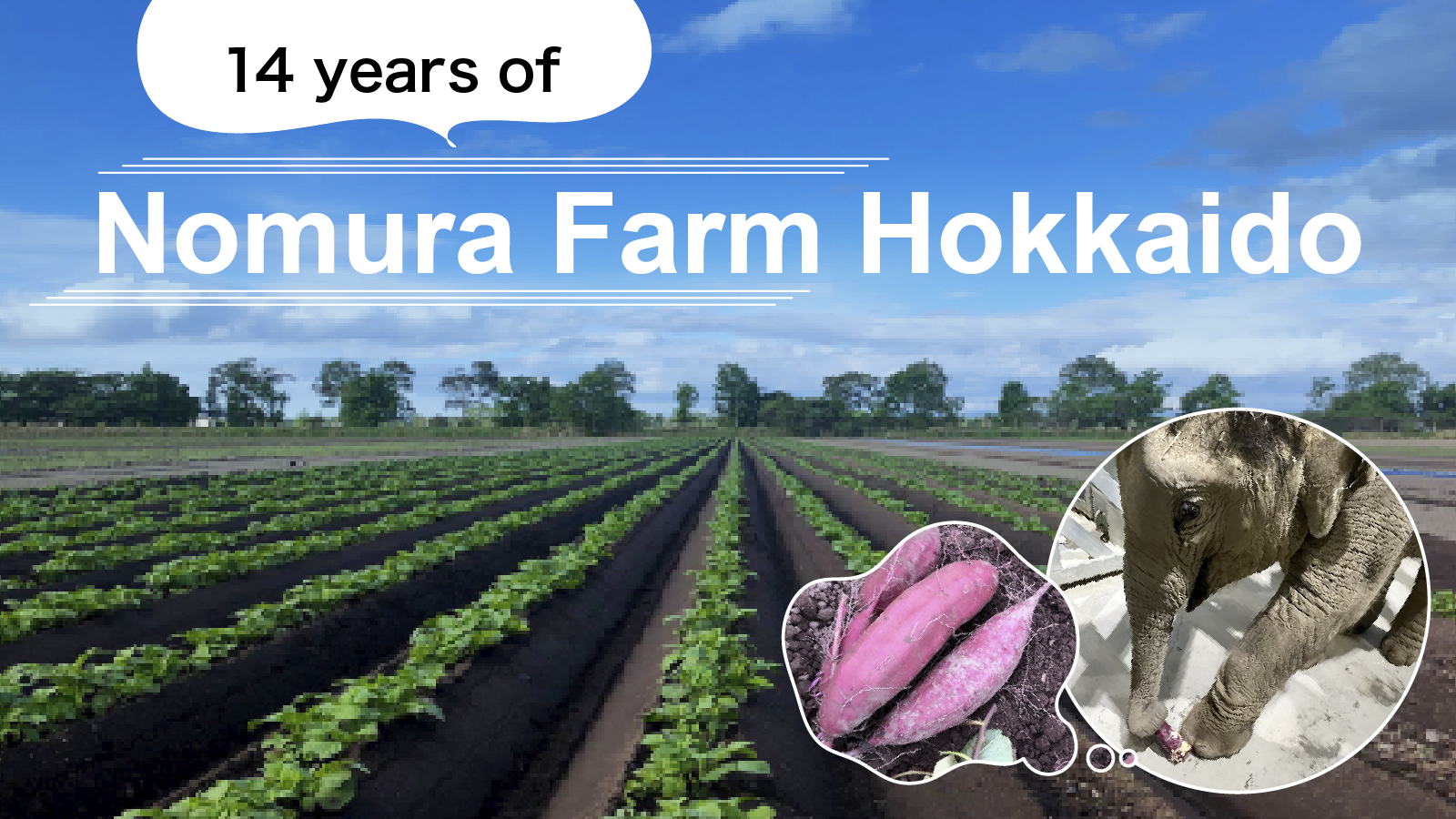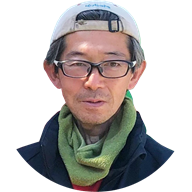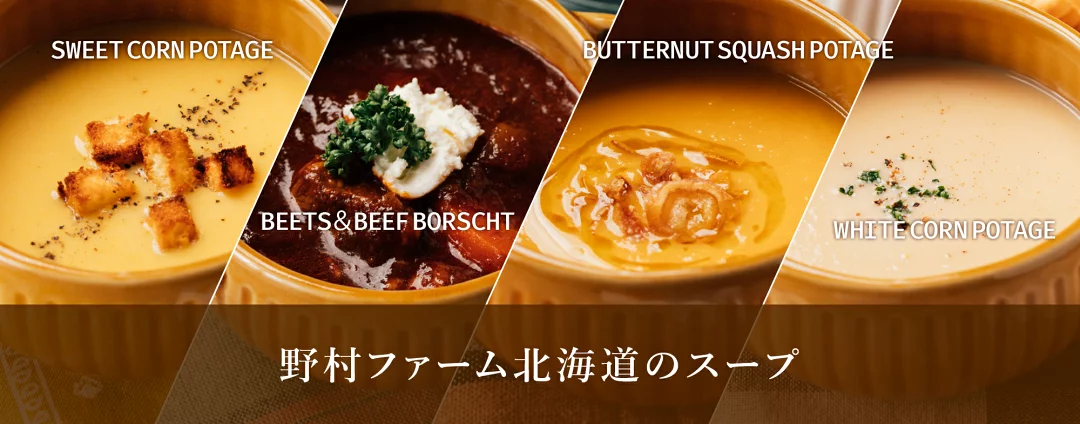
Nomura Holdings owns a farm in Ebetsu City, Hokkaido. Covering about 20 hectares (49 acres) — roughly equivalent to 28 soccer fields — the farm mainly grows corn and squash. More recently, it has also been cultivating and selling potatoes, beets, and sweet potatoes.
"I don’t think many people know that Nomura is seriously involved in agriculture," says Takeshi Sato, General Manager of Nomura Farm Hokkaido.
We asked him to tell us about Nomura’s work in regional revitalization and circular agriculture through the farming business.

An interview with...
Takeshi Sato
General Manager
Nomura Farm Hokkaido
Seconded from Nomura Securities
Q. Why did Nomura start a farm in the first place?
That’s the first question most people ask.
They wonder why a securities company would do such a thing. Nomura got involved in agriculture in Hokkaido in 2011 to support regional revitalization. Specifically, we wanted to provide research and consulting services to help address issues that local governments and regional banks were facing, especially with regard to the agricultural sector. But if we were only working from behind our desks, we would lack credibility. So, we established Nomura Farm Hokkaido as a demonstration farm, also known as an experimental farm, that would allow us to engage in farming ourselves and help us build expertise and trust.
Our crops and prepared foods are sold locally and also listed on Rakuten Ichiba (Rakuten Market), which is an online shopping platform. Since I was interested in agriculture, I applied for a role through an internal job posting in 2018 and have been on secondment here for seven years.

Q. What kinds of products do you grow?
Corn and squash are our main crops, but we also grow potatoes, beets, asparagus, and recently, because of the warmer temperatures due to climate change, sweet potatoes. We’ve had more hot days here in Hokkaido over the past three years than before, so we’ve had to consider changing some of the varieties we grow.
Our farm isn’t large by Hokkaido standards, but we do have a reasonable amount of land. We’re focusing on crop rotation — moving crops to different fields and rejuvenating the farmland.
Q. Could you tell us about the social contribution activities related to agriculture that you are involved with?
As a farm under Nomura Securities, one of our unique initiatives is financial education for local middle school students. The students come to the farm to harvest corn, then they sell it at their school. Part of the proceeds go toward funding their club activities, and this allows them to learn firsthand how to manage the money they earn.

- 拡大
- Middle school students harvesting crops and weeding. Children pick corn from stalks taller than they are, filling their bags as they go. Later, they take part in events such as sales and cooking classes, which draw many people from the community.
We are also working to put circular agriculture into practice. Sweet potatoes, for example, often grow in non-standard shapes, and we’ve been exploring how to use them instead of throwing them away. Last year, we learned that the Sapporo Maruyama Zoo was looking for feed donations, and we gave 200kg. When with spoke with staff members from the zoo, they mentioned that rising feed costs have been a challenge. This year, we received compost derived from the manure of animals at the zoo that ate the sweet potatoes we grew. We then spread it on the soil to grow sweet potatoes again, creating a loop.
Sweet potato harvesting is the most labor-intensive, so we are thinking about inviting children from the community and university students connected with the zoo to join us for a harvest experiences this autumn.

Q. Since you grow a variety of crops, you probably also have to put a lot of thought into how you harvest and sell them?
Corn has the shortest peak season. It has to be shipped within three days of being harvested. We try to stagger sowing times, but when it gets as hot as it has been lately, the crops ripen all at once, making it hard to harvest everything in time. Also, even if the flavor is good, ears that are underdeveloped can’t be shipped. To make good use of these crops, we have started processing them ourselves — a practice known in Japan as the sixth industrialization. For example, we convert harvested corn and nutrient-rich beets into soups, which we sell. We also pickle them. We aim to create a stable revenue stream through these business activities.
Looking ahead, we plan to develop soups made from sweet potatoes grown using compost from animal manure. We also hope to get seniors from local nursing homes involved in packaging the soups, part of an agricultural–welfare collaboration*. We want these products to be a tasty and nutritious option, for example, for people in nursing homes.
*The Ministry of Agriculture, Forestry and Fisheries defines an agricultural–welfare collaboration as a project where people with disabilities and others flourish through involvement in agriculture, gaining confidence and participating in society.
Q. You are contributing to the community through agriculture, but how do you hope to link this to Nomura’s business activities?
Through activities such as the harvest experiences and feed donations, we are building relationships with local schools, the zoo, and the soup processing factory, and this is contributing to the local economy. We also participate in a project of Sapporo City called “Sapporo Food Creations, where the city partners with many private companies to use Hokkaido’s rich food resources to develop new industries. Companies from a range of sectors including energy, IT, and media, hold workshops to explore how they can solve challenges in the food industry. In this context, we are also thinking about how we can work with regional banks and the kind of support we can provide businesses in the field of finance. When I exchange business cards with people, they often think that Nomura is the name of someone who runs a farm rather than the name of a corporation, so we'd like to raise the farm’s profile a bit more.

- 拡大
- After the long winter, spring arrives and buds sprout. In summer, vegetables grow and, in autumn, they reach harvest time. Nomura Farm Hokkaido thrives in this beautiful setting, throughout the changing seasons.
Q. What do you think Nomura can do for the future of agriculture?
Looking at the company’s history, Nomura’s founder Tokushichi Nomura operated a rubber farm on Borneo Island and a coffee farm in Brazil. With a vision of creating a better world, his goals transcended finance. He wanted to address social issues through agriculture. Agriculture means food, and you can’t survive on money alone if you don’t have something to eat. I think he recognized that finance and agriculture are equally important.
Our mission is to bring new perspectives that only Nomura can offer to the vital agricultural industry in Hokkaido and other rural areas, providing added value and revitalizing the sector. Agriculture is a broad field that connects to many other sectors before crops are planted, while they are growing, and after they are harvested. If the industry is revitalized and demand for funding increases, Nomura Securities can help by offering financial support. I believe our role is to effectively connect finance and agriculture.

From left: Sweet Corn Potage, Beet & Beef Borscht, Butternut Squash Potage, White Corn Potage
They are available to buy on Nomura Farm Hokkaido’s Rakuten Ichiba Store (Japanese only)
